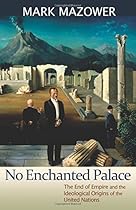Read No Enchanted Palace: The End of Empire and the Ideological Origins of the United Nations (The Lawrence Stone Lectures) by Mark Mazower Online
* No Enchanted Palace: The End of Empire and the Ideological Origins of the United Nations (The Lawrence Stone Lectures) ☆ PDF Read by # Mark Mazower eBook or Kindle ePUB Online free. No Enchanted Palace: The End of Empire and the Ideological Origins of the United Nations (The Lawrence Stone Lectures) "The Slow Death of Imperialism" according to Richard C. Geschke. To most people the United Nations was created after World War II to provide an international organization that would help prevent armed conflicts throughout the world. After suffering through two world wars and the failure of the League of Nations,the United Nations was to provide the vehicle to prevent these catastrophes from happening again. The above scenario describes the so-called sanitized version of the form. "Interesting" a

| Title | : | No Enchanted Palace: The End of Empire and the Ideological Origins of the United Nations (The Lawrence Stone Lectures) |
| Author | : | |
| Rating | : | 4.27 (986 Votes) |
| Asin | : | 0691157952 |
| Format Type | : | paperback |
| Number of Pages | : | 248 Pages |
| Publish Date | : | 2013-09-19 |
| Language | : | English |
This is a story told through the clash of personalities, such as South African statesman Jan Smuts, who saw in the UN a means to protect the old imperial and racial order; Raphael Lemkin and Joseph Schechtman, Jewish intellectuals at odds over how the UN should combat genocide and other atrocities; and Jawaharlal Nehru, India's first prime minister, who helped transform the UN from an instrument of empire into a forum for ending it. He shows how the UN's creators envisioned a world organization that would protect the interests of empire, yet how this imperial vision was decisively reshaped by the postwar reaffirmation of national sovereignty and the unanticipated rise of India and other former colonial powers. Acclaimed historian Mark Mazower forces us to set aside the popular myth that the UN miraculously rose from the ashes of World War II as the guardian of a new and peaceful global order, offering instead a strikingly original interpretation of the UN's ideological roots, early history, and changing role in world affairs. No Enchanted Palace traces the origins and early development of the United Nations, one of the most influential yet perhaps least understood organizations active in the world today.
"The Slow Death of Imperialism" according to Richard C. Geschke. To most people the United Nations was created after World War II to provide an international organization that would help prevent armed conflicts throughout the world. After suffering through two world wars and the failure of the League of Nations,the United Nations was to provide the vehicle to prevent these catastrophes from happening again. The above scenario describes the so-called sanitized version of the form. "Interesting" according to R. Albin. Another interesting book from Mark Mazower. This short book is essentially a set of lectures given by Mazower on origins of the UN. Mazower argues that much discussion of the UN is marred by anachronistic concepts of its founding purposes. Mazower stresses the continuity of the UN with the League of Nations. He highlights also the League's role, as developed by the British and the South African politician Field Mar. "A historical look that the UN's origins" according to Sean Meriwether. Manzower traces the origins of the UN Charter signed in 19A historical look that the UN's origins Sean Meriwether Manzower traces the origins of the UN Charter signed in 1945 and the ways in which it succeeds, and more often fails, to live up to our expectations for this international organization. Our hindsight view of the UN's original mission might be altruistic, even Utopian, but as the motives of the primary players are revealed we get the unsanitized reality behind the UN's first decades. The charter was a document of it. 5 and the ways in which it succeeds, and more often fails, to live up to our expectations for this international organization. Our hindsight view of the UN's original mission might be altruistic, even Utopian, but as the motives of the primary players are revealed we get the unsanitized reality behind the UN's first decades. The charter was a document of it
Short, readable, and challenging, No Enchanted Palace would make an ideal book for courses on internationalism, empire, global politics, and human rights."--J. Jordan, Canadian Journal of History"Mazower's thesis serves to illuminate enduring questions and recent debates concerning the role of the UN. The result is a lucid, perceptive, and indispensable study."--John Darwin, American Historical Review. In this book, he turns his attention to the broader theme of world order, and to the various ways in which it was being reimagined at the moment when the United Nations was created in 1945. Forceful and engaged, it will likely provoke a wide range of readers. But it is also a work of historical investigation, and Mazower brings to light many neglected details of the UN's formation and development."--John Gray,
Mark Mazower is the Ira D. Wallach Professor of History and World Order Studies at Columbia University.
Download No Enchanted Palace: The End of Empire and the Ideological Origins of the United Nations (The Lawrence Stone Lectures)
Download as PDF : Click Here
Download as DOC : Click Here
Download as RTF : Click Here
